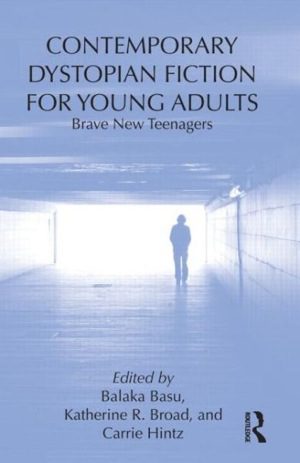Brave New Teenagers: Basu’s Book Speaks to Dystopian Fiction

English faculty member Balaka Basu’s co-edited volume Contemporary Dystopian Fiction for Young Adults: Brave New Teenagers, has been published, critically evaluating the potentials of the dystopian fiction publishing phenomenon from literary and political perspectives.
The book is the latest volume in Routledge’s Children’s Literature and Culture Series. The book includes a chapter by Balaka titled “What Faction Are You In? The Pleasure of Being Sorted in Veronica Roth’s Divergent.”
Basu is an assistant professor whose research interests include children’s and young adult literature; new media studies and digital humanities; fan, reception and audience studies; television studies; narrative theory; adaptation studies; queer theory; novels of the “long” nineteenth century (British and North American); early modern/Renaissance fiction; science fiction and fantasy; popular culture studies; and genre fiction.
Basu joined the UNC Charlotte College of Liberal Arts & Sciences faculty in 2013; prior to that, she was an adjunct lecturer at Queens College, City University of New York from 2010-2013. She earned her doctorate in English from the Graduate Center of the City University of New York and her bachelor’s degree in English from Cornell University, cum laude.
About the book, from the publisher:
The protagonists of Young Adult dystopias are introducing a new generation of readers to the pleasures and challenges of dystopian imaginings. As the dark universes of YA dystopias continue to flood the market, Contemporary Dystopian Fiction for Young Adults: Brave New Teenagers offers a critical evaluation of the literary and political potentials of this widespread publishing phenomenon.
With its capacity to frighten and warn, dystopian writing powerfully engages with our pressing global concerns: liberty and self-determination, environmental destruction and looming catastrophe, questions of identity and justice, and the increasingly fragile boundaries between technology and the self. When directed at young readers, these dystopian warnings are distilled into exciting adventures with gripping plots and accessible messages that may have the potential to motivate a generation on the cusp of adulthood.
This collection enacts a lively debate about the goals and efficacy of YA dystopias, with three major areas of contention: do these texts reinscribe an old didacticism or offer an exciting new frontier in children’s literature? Do their political critiques represent conservative or radical ideologies? And finally, are these novels high-minded attempts to educate the young or simply bids to cash in on a formula for commercial success? This collection represents a prismatic and evolving understanding of the genre, illuminating its relevance to children’s literature and our wider culture.
Basu’s Essays:
- “What Faction Are You In?: The Pleasure of Being Sorted in Veronica Roth’s Divergent.” Contemporary Dystopian Fiction for Young Adults: Brave New Teenagers. Eds. Balaka Basu, Katherine R. Broad, and Carrie Hintz. New York: Routledge, 2013: 19-34.
- “Sherlock and the (Re)Invention of Modernity.” Sherlock and Transmedia Fandom. Eds. Louisa Stein and Kristina Busse. Jefferson, NC: McFarland Press, 2012: 196-209.
- “When Worlds Continue: The Doctor’s Adventures In Fandom and Metatextuality.” Peregrinations, Ruminations, Regenerations: A Critical Approach to Doctor Who. Ed. Christopher Hanson. Newcastle-upon-Tyne: Cambridge Scholars Press, 2010: 164-176.
Basu’s Entries:
- “A Scandal in Bohemia.” In Short Story Criticism. Detroit: Gale, 2014. (As editorial advisor.)
- “Approaches to Teaching: Lady Mary Wroth.” In the Instructor’s Guide to the Broadview Anthology of English Literature, 2007. http://sites.broadviewpress.com/bablinstructors/
- “Actors.” In The Encyclopedia of Love, Courtship, and Sexuality through History Vol. 3: The Early Modern Period. Eds. Cherrie A. Gottsleben, Victoria Mondelli and Kristen P. Chew. Westport, CT.: Greenwood Press, 2007.
Basu’s Recent Presentations:
- 2013. “Playing Along with Alcott, Montgomery, and Eager: The Evolution of Participatory Culture in Children’s Literature.” Children’s Literature Association; Biloxi, MS; June 13-15.
- 2013. “‘Nothing Gold Can Stay: Reading Apocalypse, Revelation, and Paradise (Not) Regained in Fan Fiction.” Modern Language Association; Boston, MA; January 3-6.
- 2012. “‘Matters of Predestination’: Writing Out-of-Order as Prophecy in L.M. Montgomery’s Journals and Fiction.” L.M. Montgomery Institute at the University of Prince Edward Island: L.M. Montgomery and Cultural Memory; Charlottetown, PEI (Canada); June 21-24.
- 2012. “What Faction Are You In? The Pleasure of Being Sorted in Veronica Roth’s Divergent.” Children’s Literature Association; Boston, MA; June 14-16.
- 2012. “Where We Have Gone Before: Mimicry and Repeated Imagery in Star Trek.” North East Modern Language Association; Rochester, NY; March 15-18.
- 2012. “The Power of the Wound: Manifesting Trauma and Self Destruction in YA Fantasy Novels.” Modern Language Association; Seattle, WA; January 5-8.
- 2010. “‘It’s all real. I knew it!’: Metafiction, Belief and the Audience Embodied in SF/F Television.” Bristol Institute of Greece, Rome and the Classical Tradition & the Centre for Medieval Studies, University of Toronto: Desiring the Text, Touching the Past: Towards an Erotics of Reception; University of Bristol (UK); July 10.
- 2009. “The Devil’s Parties: Regency Romance and The Byronic Hero in His Dark Materials.” North East Modern Language Association; Boston, MA; February 26 – March 1.
- 2008. “When Worlds Continue: The Doctor’s Adventures in Fandom and Metatextuality.” Film and History; Chicago, IL; October 30 – November 2.
- 2007. “‘She Saved the World – A Lot’: Reading Fictional Universes and Writing Utopias in Buffy the Vampire Slayer.” Society for Utopian Studies; Toronto (Canada); October 4-7.